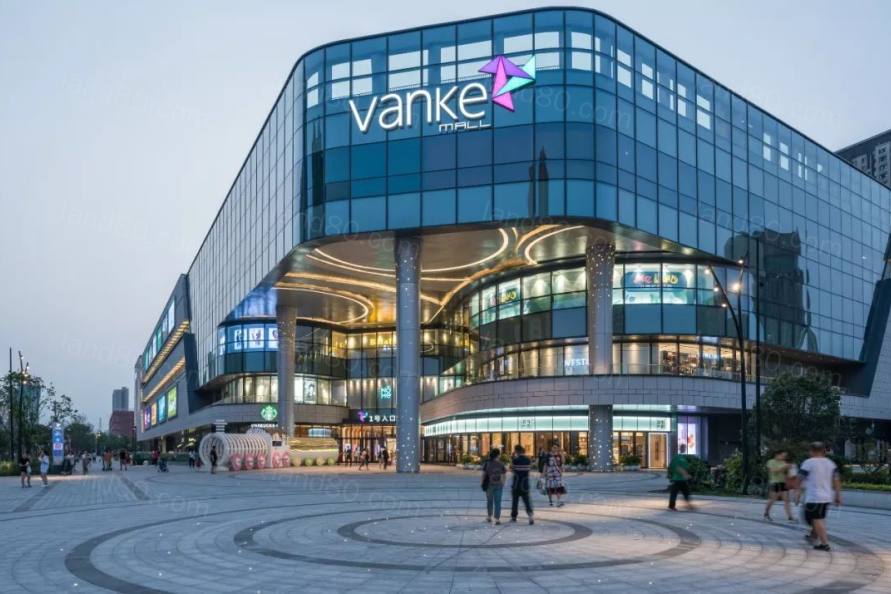
The neighborhood forest
一个将森林与社区结合的城市综合体
‘forest living room’ – boundary between community and commercial
合肥万科森林公园-万科广场 B03
Vanke Plaza of Vanke Forest Park in Hefei
前言 Preface
项目位于合肥中心区域,是一个服务于万科森林公园的综合体地块。地块开发之前万科森林公园已经开发成型了多个住宅地块。城市森林的策略在场地中戛然而止。在设计初期,我们发现了周边大量开发的居住地块以及数量巨大的社区居民。而我们的场地恰恰处于社区与城市的边界。而如何将森林公园的力量引入这个城市综合体并让其成为社区邻里生活的友善空间成为了我们的设计出发点。
The project is located in the central area of Hefei and is a comprehensive area for the Vanke Forest Park. Vanke Forest Park has developed a number of residential blocks before. At the beginning of the design, we found a large number of residential blocks around, our site is right at the boundary between communities and city. How to combine ‘forest park’ into city complex and make it an open space for neighborhood community has become our starting point of design.
策略 Strategy
与大多数的商业项目不同,我们的场地和城市界面有着一个独特的退线绿地。我们通过将森林和社区活动结合的方法将两个维度的空间叠入了这个独特的绿化带。叠加的策略既建立了一个既能满足城市社区开放空间需求的社区公园,也创造了一个时刻充满自然树荫的森林公园。不同的树影与人的活动在一天中反复交织,形成了律动变化的城市客厅。而一个灰色的棕地由此激活。
Unlike usual commercial projects, between our site and urban interfaces, there’s an unique retreat green space. We have combined forest and community space into our site to create a unique green belt. The superimposed strategy not only establishes a community park that meets the needs of the open space of urban communities, but also creates a forest park with natural shadows. Sunlight filtering down through the trees, people have fun here, they overlap and interweave, they form the ‘urban living room’ together.

△ 分析图-界面的组成 Diagram-Interface

△ 分析图-商业的“森林客厅”功能 Diagram- ‘forest living room’ of commercial

△ 分析图-住宅的“森林客厅”功能 Diagram- ‘forest living room’ of residents


△ 分析图-总图 Site Plan
分区设计 Zoning
“邻里之森:邻里之森是最直接体现以森林为品牌主题,并进行社区与商业边界交流的重要场地,设计延续地块作为开放空间的整体性与时代感,同时结合社区邻里交流与商业户外休闲进行场地的组合与场景的设置。
Forest park of ‘forest living room’: As an important part for people to have communications with each other, we extend the design language and atmosphere of urban park, to create multiple composite scenarios for communities and outdoor commercial area.

△ 分析图-模块 Diagram – Zones
与入口广场交汇的区域,镜面叠水自林中叠落,及处理了场地高差,形成了重要的标志性主题景观节点。
In the main entrance plaza area, we designed a water feature with multi-layers inside the forest to eliminate the high difference and create an iconic landscape here.


多功能的林下镜面墙是林中空地休闲互动的乐园,也是林带之中,水面之上重要的项目标志元素。
The multi-functional mirror wall is a recreational and interactive elements for forest park. It is also an important landscape section of our project.






连接两个重要入口林林下公园界面,又纵向结合斜切的线形语言构成,迎合了城市人流的高效导入,有在内部建立了连接入口的休闲空间系统。
Combine two important entrance of shopping mall, we designed a forest park by using linear language to guide the pedestrian flow, and build up a leisure park system inside the forest.






公园之森:与西侧入口广场交汇处,同样顺林带坡地之式汇聚成艺术斜瀑与广场交汇形成互动镜面水景,融洽的转换场地功能,同时形成入口空间重要的景点与和互动元素,进一步激活了林下公园与商业集散。
‘Forest Park’: Water flows from waterfall to pool complies with the terrain, water features and micro-topography landscape were placed in the intersection of Forest Park and western entrance square. It become an important attraction and interactive place for commercial entrance space.



众乐之森:该板块位于项目南侧,界面场地内外有1.5米高差,比邻学校,利用有限的带状缓冲场地营造一处林下的创意乐园,激活商业的儿童娱乐氛围有支撑社区及学校的亲子游乐需求,同时通过切割状的防护林带绿地,形成围合性空间并过渡解决场地高差。
‘Joy Forest’ : On the south side of the project, with 1.5 high difference, we wanted to create a linear buffer zone combine with children’s playground. We used linear shelterbelt to eliminate the elevation difference and design a enclose space for kids. It’s not only to satisfied the demand of community and schools surround, but also can active the atmosphere of entertainment.


聚友之森:建筑围合与半围合的大型商业中庭也继续延续林下客厅的主题概念,带来独特的休闲氛围,大量林下空间留白为多变的商业庭院需求提供了支持,形成独特的森林之庭。
‘Party Forest’:The large commercial atrium also continues the theme of ‘living room under the forest’, square with trees provide a comfort place for commercial activities and leisure courtyard.



彩叶之森:商业入口作为重要的集散场地,设计主要在形式上呼应“森林客厅”的主题,并提取主题元素结合需求进行局部设计语言的突变,比如呼应建筑入口柱廊的年轮铺装,叶片像素铺装、树阵广场等。
‘Colored Forest’:As the important entrance of shopping mall, we combined the theme of ‘forest living room’ and picked up some elements from ‘forest’, like leaves, branches, annual-rings and etc. Elements from forest can be found in the site everywhere: the annual-ring pavement pattern of the entrance plaza, pixel pavement of leaves, the shape of water features…





结语
Conclusion
万科森林公园-万科广场的“社区之森”是一个有趣的实践,他旨在通过将自然与社区以维度交织的方法带入城市综合体。并使用最小的力量将一个城市中空绿化带转化成为 一个能够承载城市以及社区功能的森林客厅。
The neighborhood forest is an important landscape practical of Vanke Forest Park. It aims to bring nature and neighborhood into the urban complex by transforming a buffer green belt into a forest living room that meets the needs of both city and community.
项目名称:合肥万科森林公园-万科广场
客户:合肥万科
规模:41800平米
景观设计: Lab D+H
主创设计师:林淼
设计团队:凌建业、梁宗杰、曹容、林顺文、陈先威、凌蝉榕、丁秋伟、任亚成、沈永楷
客户团队:任鹏飞、王文倩、汪凯、吴波、王东方、陈松
建筑:上海广万东建筑设计咨询有限公司(HMA)
儿童设施:上海巧拾景观科技有限公司
标示:深圳市天策规划设计有限公司
景观施工:深圳市璞道园林景观有限公司
实景照片版权:鲁冰
Project Name:Neighborhood forest- Vanke Forest Park
Client: Hefei Vanke
Area: 41800 .0㎡
Landscape Design: Lab D+H
Design Team: Miao Lin, Jianye Ling, Zongjie Liang, Rong Cao, Shunwen Lin, Xianwei Chen, Chanrong Ling, Qiuwei Ding, Yacheng Ren, Yongkai Shen
Client Team: Pengfei Ren, Kai Wang, Bo Wu, Song Chen, Wenqian Wang, Dongfang Wang
Architects:HMA Architects & Designers
Children’s facility design:Shiqiao Landscape Technology Co. Ltd.
Visual Identity Design: TCIDEA
Construction: Pudao Landscape Co. Ltd.
Photo credit: Bing Lu
|